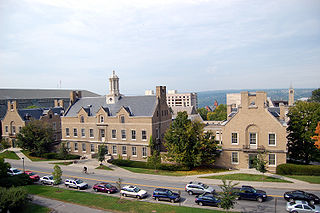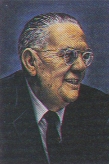Industrial relations or employment relations is the multidisciplinary academic field that studies the employment relationship; that is, the complex interrelations between employers and employees, labor/trade unions, employer organizations, and the state.
Collective bargaining is a process of negotiation between employers and a group of employees aimed at agreements to regulate working salaries, working conditions, benefits, and other aspects of workers' compensation and rights for workers. The interests of the employees are commonly presented by representatives of a trade union to which the employees belong. The collective agreements reached by these negotiations usually set out wage scales, working hours, training, health and safety, overtime, grievance mechanisms, and rights to participate in workplace or company affairs.
In United States labor law, a jurisdictional strike is a concerted refusal to work undertaken by a union to assert its members' right to particular job assignments and to protest the assignment of disputed work to members of another union or to unorganized workers. The Taft-Hartley amendments to the National Labor Relations Act empowered the National Labor Relations Board to resolve such jurisdictional disputes and authorized the General Counsel of the NLRB to seek an injunction barring such strikes.
Featherbedding is the practice of hiring more workers than are needed to perform a given job, or to adopt work procedures which appear pointless, complex and time-consuming merely to employ additional workers. The term "make-work" is sometimes used as a synonym for featherbedding.

The New York State School of Industrial and Labor Relations at Cornell University (ILR) is an industrial relations school and one of the four New York State contract colleges at Cornell University, located in Ithaca, New York, United States. The School has six academic departments which include: Economics, Human Resource Management, International and Comparative Labor, Labor Relations, Organizational Behavior, and Social Statistics.

William Foote Whyte was an American sociologist chiefly known for his ethnographic study in urban sociology, Street Corner Society. A pioneer in participant observation, he lived for four years in an Italian community in Boston while a Junior Fellow at Harvard researching social relations of street gangs in Boston's North End.
Tom Juravich is a professor of Labor Studies at the University of Massachusetts Amherst.
Kate Bronfenbrenner is the Director of Labor Education Research at the Cornell University School of Industrial and Labor Relations. She is a leading authority on successful strategies in labor union organizing, and on the effects of outsourcing and offshoring on workers and worker rights.
The Martin P. Catherwood Library, commonly known as the Catherwood Library or simply the ILR Library, serves the New York State School of Industrial and Labor Relations at Cornell University. One of over a dozen libraries within the Cornell University Library system, the Catherwood Library is considered the most comprehensive resource of its kind in North America. The Catherwood Library's stated mission is to serve as a comprehensive information center in support of the research, instruction, and service commitments of the Industrial and Labor Relations School and Cornell community. The Catherwood Library is an official Depository Library of the International Labour Organization (ILO), one of only two in the country to be so designated; the other is the Library of Congress.
Ellen Dannin is an American professor who has taught and written primarily about American and New Zealand labor and employment law. She also writes about privatization of government services and public infrastructure. Her most recent law school position was as the Fannie Weiss Distinguished Faculty Scholar and professor of law at Penn State Dickinson School of Law.
Richard Hurd is a professor of labor relations emeritus and former director of Labor Studies at the Cornell University School of Industrial and Labor Relations.
Julius Gerson Getman is a professor of law at the University of Texas School of Law, and a noted labor and employment law scholar and labor historian.

Ruth Milkman is an American sociologist of labor and labor movements. She is Distinguished Professor of Sociology at the Graduate Center, CUNY and the director of research at CUNY School of Labor and Urban Studies. Between 1988 and 2009 Milkman taught at the University of California, Los Angeles, where she directed the UCLA Institute for Research on Labor and Employment.
Bruce Nissen is a professor emeritus of labor studies and director of research at the Center for Labor Research and Studies (CLRS) at Florida International University (FIU). He also formerly directed that university's Research Institute on Social and Economic Policy (RISEP).
The International Labor Communications Association (ILCA) is a professional organization for trade union publications and media production departments of national, regional and/or local affiliates of the AFL–CIO and Canadian Labour Congress. It is a nonpartisan, non-profit organization which provides resources, expertise and networking opportunities for labor communicators.

George W. Taylor was a professor of industrial relations at the Wharton School at the University of Pennsylvania, and is credited with founding the academic field of study known as industrial relations. He served in several capacities in the federal government, most notably as a mediator and arbitrator. During his career, Taylor settled more than 2,000 strikes.
A collective agreement, collective labour agreement (CLA) or collective bargaining agreement (CBA) is a written contract negotiated through collective bargaining for employees by one or more trade unions with the management of a company that regulates the terms and conditions of employees at work. This includes regulating the wages, benefits, and duties of the employees and the duties and responsibilities of the employer or employers and often includes rules for a dispute resolution process.
Michael H. Belzer is an internationally recognized expert on the trucking industry, especially the institutional and economic impact of deregulation. He is a professor in the economics department at Wayne State University. He is the author of Sweatshops on Wheels: Winners and Losers in Trucking Deregulation. Along with Gregory M. Saltzman, he coauthored Truck Driver Occupational Safety and Health: 2003 Conference Report and Selective Literature Review, National Institute for Occupational Safety and Health, 2007. He has written many peer-reviewed articles on trucking industry economics, labor, occupational safety and health, infrastructure, and operational issues.

Linda Puchala is an American government official who has served as a member of the National Mediation Board (NMB) since 2009. Puchala is the former president of the Association of Flight Attendants.
James B. Stewart (1947) is an American economist who is Professor Emeritus of Labor and Employment Relations, African and African American Studies, and Management and Organization at Pennsylvania State University. In 2021, he was awarded the Samuel Z. Westerfield Award, the highest award of the National Economic Association.




